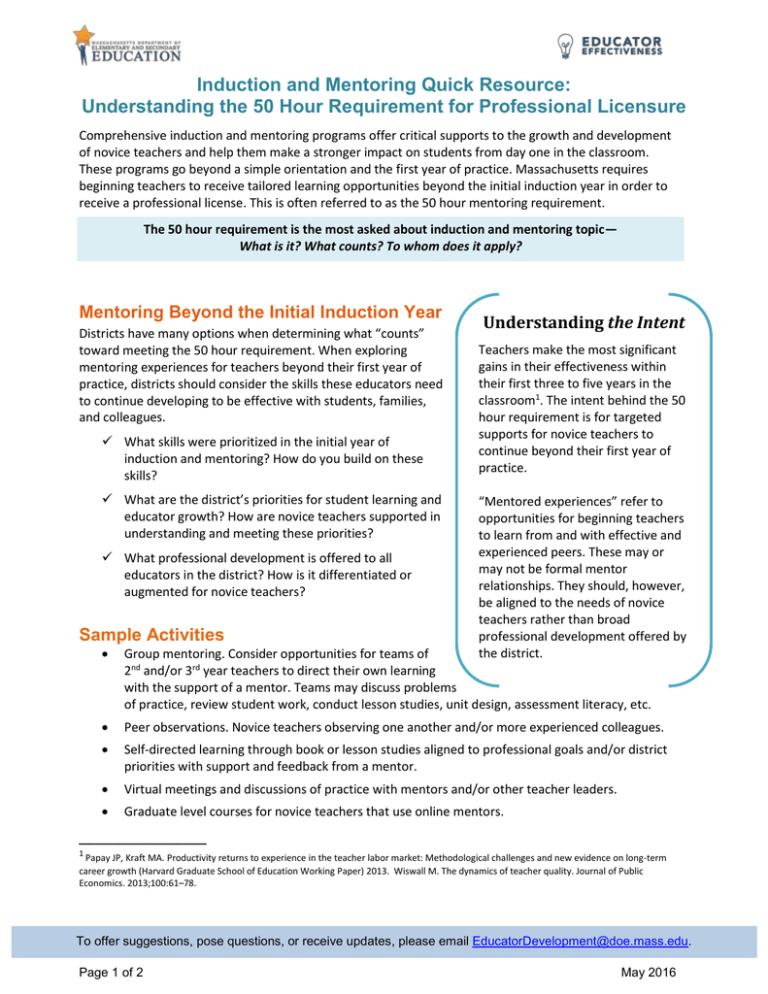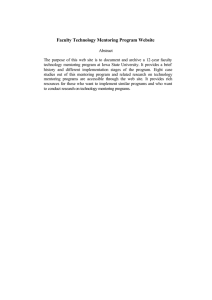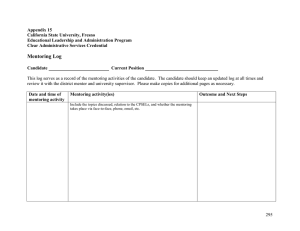50HourRequirement
advertisement

Induction and Mentoring Quick Resource: Understanding the 50 Hour Requirement for Professional Licensure Comprehensive induction and mentoring programs offer critical supports to the growth and development of novice teachers and help them make a stronger impact on students from day one in the classroom. These programs go beyond a simple orientation and the first year of practice. Massachusetts requires beginning teachers to receive tailored learning opportunities beyond the initial induction year in order to receive a professional license. This is often referred to as the 50 hour mentoring requirement. The 50 hour requirement is the most asked about induction and mentoring topic— What is it? What counts? To whom does it apply? Mentoring Beyond the Initial Induction Year Districts have many options when determining what “counts” toward meeting the 50 hour requirement. When exploring mentoring experiences for teachers beyond their first year of practice, districts should consider the skills these educators need to continue developing to be effective with students, families, and colleagues. What skills were prioritized in the initial year of induction and mentoring? How do you build on these skills? What are the district’s priorities for student learning and educator growth? How are novice teachers supported in understanding and meeting these priorities? What professional development is offered to all educators in the district? How is it differentiated or augmented for novice teachers? Sample Activities Understanding the Intent Teachers make the most significant gains in their effectiveness within their first three to five years in the classroom1. The intent behind the 50 hour requirement is for targeted supports for novice teachers to continue beyond their first year of practice. “Mentored experiences” refer to opportunities for beginning teachers to learn from and with effective and experienced peers. These may or may not be formal mentor relationships. They should, however, be aligned to the needs of novice teachers rather than broad professional development offered by the district. Group mentoring. Consider opportunities for teams of 2nd and/or 3rd year teachers to direct their own learning with the support of a mentor. Teams may discuss problems of practice, review student work, conduct lesson studies, unit design, assessment literacy, etc. Peer observations. Novice teachers observing one another and/or more experienced colleagues. Self-directed learning through book or lesson studies aligned to professional goals and/or district priorities with support and feedback from a mentor. Virtual meetings and discussions of practice with mentors and/or other teacher leaders. Graduate level courses for novice teachers that use online mentors. _____________ 1 Papay JP, Kraft MA. Productivity returns to experience in the teacher labor market: Methodological challenges and new evidence on long-term career growth (Harvard Graduate School of Education Working Paper) 2013. Wiswall M. The dynamics of teacher quality. Journal of Public Economics. 2013;100:61–78. To offer suggestions, pose questions, or receive updates, please email EducatorDevelopment@doe.mass.edu. Page 1 of 2 May 2016 Induction and Mentoring Quick Resource: Understanding the 50 Hour Requirement for Professional Licensure Frequently Asked Questions How many hours of induction and mentoring are required in the first year? There are no set time requirements for the first year of an induction and mentoring program. When do most teachers complete the 50 hours required beyond the initial induction year? Typically, teachers will complete the 50 hours within their second and third year of practice. The hours must be completed before the teacher obtains his or her Professional license. Does mentoring have to be one-to-one? No, the 50 hours do not need to be structured as one-to-one mentoring. Districts are encouraged to think about group mentoring, self-directed learning opportunities, and virtual mentoring opportunities. Additionally, even in the first year, one-toone mentoring is not a requirement. What are the requirements for a teacher who transfers from another MA district? It is at the employing district’s discretion to determine the needs of the new educator and what induction and mentoring requirements he or she may be able to carryover from a previous district. What’s Required? To receive a professional license, teachers must have “at least 50 hours of a mentored experience beyond the induction year.” Administrator licenses require induction and mentoring, but do not include the 50 hours requirement. Not sure if a particular license requires 50 hours of mentoring beyond the induction year? Use the Licensure Requirements Tool! Do specialists and administrators need an additional 50 hours of mentoring beyond the initial induction year for professional licensure? In most cases, no. Use the Licensure Requirements Tool to quickly verify the requirements for a specific license (input a license, grade level, and select Professional as the license type). Meeting the Requirements Ultimately, the district will complete ESE’s Employment Verification Form confirming a teacher has met all of the employment related requirements necessary to receive his or her professional license, including those associated with induction and mentoring. Individual districts should determine how they will track and maintain records of teachers completing these requirements. A few promising practices include: Using online data management systems to log hours, such as a Google spreadsheet. Pre-populating forms with district-required professional development (established PD days, mentor/mentee meeting schedules, etc.). Setting clear expectations for who is responsible for tracking the hours (mentor, mentee, district personnel, or a combination). Helpful Links Induction and Mentoring Website 2015 Induction and Mentoring Guidelines Induction and Mentoring Annual Report Induction and Mentoring Resources To offer suggestions, pose questions, or receive updates, please email EducatorDevelopment@doe.mass.edu. Page 2 of 2 May 2016


